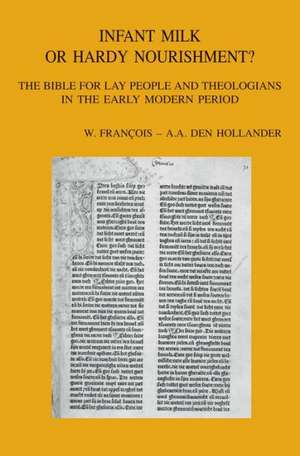Infant Milk or Hardy Nourishment?: The Bible for Lay People and Theologians in the Early Modern Period: Bibliotheca Ephemeridum Theologicarum Lovaniensium, cartea 221
Editat de W. Francois, A. A. Den Hollanderen Limba Engleză Paperback – 31 iul 2009
Din seria Bibliotheca Ephemeridum Theologicarum Lovaniensium
-
 Preț: 469.95 lei
Preț: 469.95 lei - 19%
 Preț: 571.69 lei
Preț: 571.69 lei - 19%
 Preț: 571.48 lei
Preț: 571.48 lei - 19%
 Preț: 469.85 lei
Preț: 469.85 lei - 19%
 Preț: 601.37 lei
Preț: 601.37 lei - 19%
 Preț: 453.47 lei
Preț: 453.47 lei - 19%
 Preț: 443.51 lei
Preț: 443.51 lei - 19%
 Preț: 468.91 lei
Preț: 468.91 lei - 19%
 Preț: 500.26 lei
Preț: 500.26 lei - 19%
 Preț: 460.04 lei
Preț: 460.04 lei - 19%
 Preț: 568.05 lei
Preț: 568.05 lei - 19%
 Preț: 603.23 lei
Preț: 603.23 lei - 19%
 Preț: 576.42 lei
Preț: 576.42 lei - 19%
 Preț: 691.86 lei
Preț: 691.86 lei - 19%
 Preț: 450.69 lei
Preț: 450.69 lei - 19%
 Preț: 530.09 lei
Preț: 530.09 lei - 19%
 Preț: 685.93 lei
Preț: 685.93 lei - 19%
 Preț: 464.23 lei
Preț: 464.23 lei - 19%
 Preț: 520.03 lei
Preț: 520.03 lei - 19%
 Preț: 446.31 lei
Preț: 446.31 lei - 19%
 Preț: 541.34 lei
Preț: 541.34 lei - 19%
 Preț: 530.09 lei
Preț: 530.09 lei - 19%
 Preț: 528.85 lei
Preț: 528.85 lei - 19%
 Preț: 499.17 lei
Preț: 499.17 lei - 19%
 Preț: 607.58 lei
Preț: 607.58 lei - 19%
 Preț: 536.67 lei
Preț: 536.67 lei - 23%
 Preț: 834.79 lei
Preț: 834.79 lei - 19%
 Preț: 591.36 lei
Preț: 591.36 lei - 19%
 Preț: 489.16 lei
Preț: 489.16 lei -
 Preț: 471.90 lei
Preț: 471.90 lei - 19%
 Preț: 655.39 lei
Preț: 655.39 lei - 19%
 Preț: 606.34 lei
Preț: 606.34 lei - 19%
 Preț: 568.23 lei
Preț: 568.23 lei - 19%
 Preț: 576.24 lei
Preț: 576.24 lei - 19%
 Preț: 667.50 lei
Preț: 667.50 lei - 19%
 Preț: 454.73 lei
Preț: 454.73 lei - 19%
 Preț: 431.81 lei
Preț: 431.81 lei - 19%
 Preț: 648.56 lei
Preț: 648.56 lei - 19%
 Preț: 610.24 lei
Preț: 610.24 lei - 19%
 Preț: 593.39 lei
Preț: 593.39 lei - 19%
 Preț: 665.84 lei
Preț: 665.84 lei -
 Preț: 509.01 lei
Preț: 509.01 lei - 19%
 Preț: 553.95 lei
Preț: 553.95 lei - 19%
 Preț: 593.08 lei
Preț: 593.08 lei -
 Preț: 519.24 lei
Preț: 519.24 lei - 19%
 Preț: 486.52 lei
Preț: 486.52 lei - 19%
 Preț: 624.71 lei
Preț: 624.71 lei - 19%
 Preț: 549.94 lei
Preț: 549.94 lei - 19%
 Preț: 636.29 lei
Preț: 636.29 lei - 23%
 Preț: 566.32 lei
Preț: 566.32 lei
Preț: 607.14 lei
Preț vechi: 749.55 lei
-19% Nou
Puncte Express: 911
Preț estimativ în valută:
116.19€ • 121.15$ • 96.56£
116.19€ • 121.15$ • 96.56£
Carte indisponibilă temporar
Doresc să fiu notificat când acest titlu va fi disponibil:
Se trimite...
Preluare comenzi: 021 569.72.76
Specificații
ISBN-13: 9789042921443
ISBN-10: 9042921447
Pagini: 488
Dimensiuni: 160 x 241 x 33 mm
Greutate: 1.02 kg
Editura: Peeters
Seria Bibliotheca Ephemeridum Theologicarum Lovaniensium
ISBN-10: 9042921447
Pagini: 488
Dimensiuni: 160 x 241 x 33 mm
Greutate: 1.02 kg
Editura: Peeters
Seria Bibliotheca Ephemeridum Theologicarum Lovaniensium
